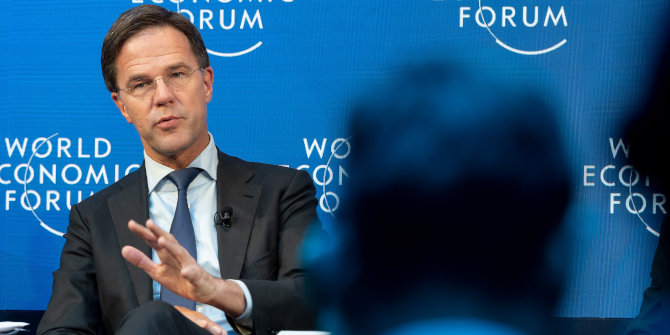 The right-wing populist Forum for Democracy won the largest share of the vote in the Netherlands’ provincial elections on 20 March. Simon Otjes writes that with European elections just around the corner, pressure is building on Mark Rutte’s government.
The right-wing populist Forum for Democracy won the largest share of the vote in the Netherlands’ provincial elections on 20 March. Simon Otjes writes that with European elections just around the corner, pressure is building on Mark Rutte’s government.
The upcoming European elections in the Netherlands will be the second elections in a row in what is a ‘mid-term’ year for the third cabinet led by Mark Rutte. Following a disappointing result in the first contest – the provincial elections held in March – the centre-right coalition is now under pressure from both the left and the right.
Rutte’s third cabinet was formed after the longest coalition negotiations in Dutch history. After months of negotiation, two Christian parties, the Christian-Democratic Appeal (CDA) and the Christian-social ChristianUnion (CU), and two liberal parties, Rutte’s Liberal Party (VVD) and the social-liberal D66, were able to agree on an agenda of tax cuts for corporations and citizens and a commitment to reaching the goals set in the Paris Climate Agreement. They have a razor-thin majority in the House and the Senate. In its first year, the cabinet lost most of its goodwill as the coalition parties insisted on implementing an unpopular tax cut for multinational corporations despite growing resistance from society. This made it practically impossible for the coalition to retain its one-seat majority in the Senate.
Pressure from the left and the right
The provincial elections mattered for the cabinet because the members of the provincial councils will elect the Senate in May. The election campaign was dominated by the second priority of the coalition: increasing Dutch action against climate change. The climate agenda of the cabinet came under pressure from both the left and the right. The largest party to the left of the cabinet, the left-wing green GreenLeft led by Jesse Klaver, criticised the cabinet’s plans on the basis that they put the financial burdens of energy transition onto the shoulders of consumers instead of polluting companies.
The smallest party to the right of the coalition, the radical right-wing populist Forum for Democracy led by Thierry Baudet, was the strongest voice against the notion that the Netherlands can do anything to stop global warming. This relatively new party won its first two seats in the House in 2017. It was founded as a Eurosceptic think tank in 2015 and its message is similar to that of many radical right-wing populist parties in Europe, although the party also has a libertarian streak.

Mark Rutte, Credit: World Economic Forum (CC BY-NC-SA 2.0)
Forum for Democracy, which until now had not been represented in the provincial councils, immediately became the largest party in terms of vote share, with around 15% of the vote. The result highlighted dissatisfaction on the right with the cabinet’s policy on environmental matters, but the party also criticised the country’s migration policy and the abolition of advisory referendums permitted under a 2015 law. The party believes that the Netherlands would be better off outside the EU. It also flirts with more radical ideas: in his victory speech, Baudet lamented the decline of the “Boreal Europe”, a term that Jean-Marie Le Pen has used to refer to the “Aryan” ancestors of European peoples.
The GreenLeft also made strong gains: going from 5% in 2015 to 11% of the vote. The government is likely to look to the GreenLeft for support, in particular on environmental matters. This party has been reluctant to enter a comprehensive confidence and supply agreement with the government, but it has indicated a willingness to cooperate on climate matters. Other than Forum for Democracy or the GreenLeft, no single party is likely to be sufficient for a majority in the Senate. The process of discovering whether and how the coalition can secure a majority in the Senate will continue to dominate political news in the coming weeks.
Pro-European and Eurosceptic forces
Meanwhile, the top-candidates on the Dutch lists for the European Parliament are ready to start their campaign. Three leaders are particularly interesting for a European audience. The top-candidates for the GreenLeft and the Labour Party (PvdA) play a special role in the European election because their leaders are Spitzenkandidaten for their European parties. Vice-president of the European Commission, Frans Timmermans, is the Spitzenkandidat of the Party of European Socialists, and the only candidate in the election with any chance of beating Manfred Weber. The GreenLeft MEP Bas Eickhout is one of two Spitzenkandidaten for the European Greens, together with the German MEP Ska Keller.
Derk-Jan Eppink, the top-candidate for Forum for Democracy, has had a long European career. First, as a journalist and as a member of the cabinet of the Dutch liberal Commissioner Frits Bolkestein. Between 2009 and 2014, he served as an MEP for the liberal populist List Dedecker, which sat in the European Conservatives and Reformists group. In 2014, he was a candidate for the European parliament for Rutte’s VVD, which is a member of the Alliance for Liberals and Democrats for Europe.
The EU campaign is gearing up to be a pro/anti-EU campaign. Forum for Democracy will be the main face of the Eurosceptic side, outshining the PVV of Geert Wilders that used to have this role. Timmermans will be a major voice on the pro-European side, as will the GreenLeft.
The polarisation will come at the expense of the coalition. In particular, the VVD and D66 are likely to suffer heavy losses. Their voters are less loyal than those of the CDA and CU, as the provincial council elections have already shown. The VVD’s electorate overlaps with that of Forum for Democracy; D66’s electorate with that of PvdA and the GreenLeft.
A new playing field
This polarisation will come at the expense of the coalition. The election results are likely to resemble the provincial council elections: fragmentation of the vote, with good results for the opposition parties to the right and the left of the coalition. The electorate of the VVD and the CDA are likely to feel the pull toward Forum for Democracy, while the party will also win seats from the Freedom Party. The electorate of D66 may be drawn toward the PvdA and the GreenLeft.
Please read our comments policy before commenting.
Note: This article gives the views of the author, not the position of EUROPP – European Politics and Policy or the London School of Economics.
_________________________________
 Simon Otjes – Leiden University / Groningen University
Simon Otjes – Leiden University / Groningen University
Simon Otjes is an Assistant Professor at Leiden University and a Researcher at the Documentation Centre Dutch Political Parties of Groningen University.




